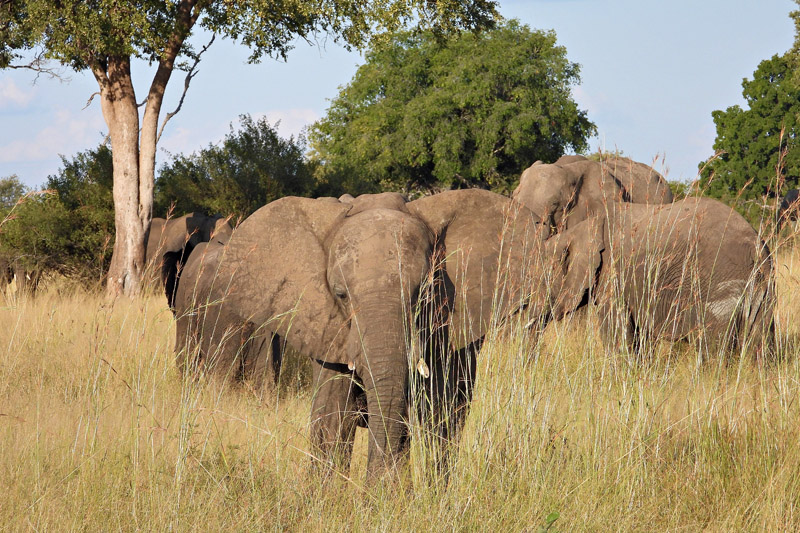Communication Lessons from Nature: Hugh Coppen
In this podcast episode, guest Hugh Coppen and host George Torok discuss the communication methods of animals in the African wilderness and draw parallels to human interaction.
Coppen highlights the importance of body language, scent, and listening in animal communication, and suggests humans can learn from these methods. He also shares insights from his safari tours in Zimbabwe, emphasizing the benefits of immersing oneself in nature.
The episode concludes with Coppen suggesting that humans could improve their communication skills by emulating elephants' listening and decision-making abilities.
The power of listening (00:00:00)
Nature communicates through listening and paying attention to the messages from the wild. Listening allows for a deeper understanding and learning from the environment.
Body language as a communication method (00:04:25)
Animals in the wild primarily communicate through body language, such as the position of the head, ears, and tail. Understanding body language can provide insights into their intentions and emotions.
Bonding and team spirit (00:12:21)
Animals like lions, baboons, and African wild dogs use grooming, nuzzling, and playing to bond and build team spirit before engaging in activities together. This parallels human practices in sports teams and sales teams to create a sense of belonging and unity.
The message of belonging (00:12:34)
Animals convey the message of belonging and being on the same side through alarm calls and specific sounds that indicate the presence of predators.
Elephants' secret communication channel (00:18:22)
Elephants have a sophisticated communication system that includes sub-oral rumbling sounds, which humans can't hear, allowing them to communicate over long distances and coordinate movements.
Respect and mutual roles in animal groups (00:20:47)
Animals, such as lions and elephants, demonstrate mutual respect within their species and understand each other's roles and responsibilities within the group.
The wisdom and wonder of nature (00:25:37)
Hugh discusses the purpose of going on a safari tour and how it can lead to a deeper understanding of nature and ourselves.
Revitalized purpose in preserving nature (00:26:21)
After a deep immersion in nature, people come away with a renewed sense of purpose to preserve wildlife and their habitats.
Advice from an elephant (00:27:56)
If an elephant could give advice, it would emphasize the importance of being a better listener, taking time to make decisions, and finding contentment in one's own life.
Learning from Nature: Insights into Human Communication from the African Wilderness
As the host of my podcast, I had the pleasure of engaging in a fascinating conversation with Hugh Coppen, a seasoned explorer of the African wilderness. Our discussion revolved around the intriguing parallels between animal communication and human interaction. This blog post aims to share the insights and lessons we gleaned from this enlightening conversation.
The Art of Communication in the Wild
Hugh began by explaining the different ways animals in nature communicate. Contrary to popular belief, vocalization, such as roaring or trumpeting, is not their primary method of communication. Instead, animals primarily use body language, scent, and listening to convey their intended messages.
Hugh emphasized the importance of listening and learning from nature. He shared his experiences from his safaris, where he encourages guests to switch off the engine of the vehicle and simply listen. This practice, he explained, heightens their awareness of their surroundings and the messages from the wild.
Parallels between Animal Communication and Human Interaction
Drawing parallels between animal communication and human interaction, I noted that when animals stand still and watch, it can indicate aggression or caution. Similarly, when humans meet someone who gives them a stare, it may suggest ill intentions. On the other hand, movement and relaxation in body language can indicate comfort and openness for conversation.
Hugh agreed with my observations and highlighted the importance of recognizing and interpreting body language in human communication. He believes that many body signals are often overlooked or misinterpreted. By paying attention to body language, individuals can gain valuable insights into others' emotions, intentions, and attitudes.
The Message of Belonging in the Animal Kingdom
One of the most intriguing parts of our conversation was when Hugh explained how animals convey the message of belonging and being on the same side. This message is critical for survival in the animal kingdom. One common way animals convey this message is through alarm calls. For example, a baboon's bark or an impala ram's cough can alert other species to the presence of a predator. These alarm calls not only communicate the presence of a threat but also specify the type of predator.
The Sophistication of Animal Vocalizations
Hugh also discussed how animals communicate through vocalizations. He mentioned that elephants have a sophisticated communication system, including low-frequency rumbles that humans can't hear. Elephants use these rumbles to communicate with each other, and they can hear them over long distances by listening through the ground. This secret communication channel allows elephants to coordinate their movements, such as when they all move off from a waterhole in unison.
The Benefits of Immersion in Nature
When asked about the benefits of participating in safari tours in Zimbabwe, Hugh explained that the purpose of their tours is to provide a deeper immersion into nature, allowing people to understand the wisdom and wonder of the natural world. He believes that by experiencing this immersion, individuals can gain a new perspective on themselves and their relationship with nature. Many participants come away from the experience with a renewed sense of purpose and a desire to preserve wildlife and natural spaces.
Lessons from the Elephant
In wrapping up our conversation, I asked Hugh what advice an elephant might give to improve human communication skills. Hugh suggested that the elephant would emphasize the importance of being a better listener, taking time to make thoughtful decisions, and considering one's own desires and goals in life. He highlighted the contentment and peace that elephants find in their simple existence and encourages humans to find happiness and comfort in their own lives, regardless of material possessions.
Conclusion


